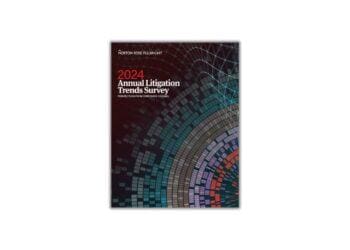In a (highly) regulated work environment, leadership frequently fails to distinguish between compliance and ethics. Compliance is typically defined as adhering to a specification, policy, standard or law and reflects having appropriate systems and controls in place that conform to required standards. Ethics identifies right and wrong behavior, is frequently subjective and in the work environment reflects the culture and how it is strategized, prioritized and enforced, or even paid attention to.
Being in compliance might affect ethics; however, it is not quid pro quo. Enron was widely looked upon as the paragon of well-developed compliance and ethical policies, but its failure spectacularly underscores that lofty words on paper and checked compliance boxes do not mean a company will do the right thing.
For multinational firms, escalating enforcement of the U.S. Foreign Corrupt Practices Act poses risk to both U.S. and non-U.S. companies. Newer and country-specific laws including the United Kingdom’s Anti-Bribery Act, China’s Amendment 8 of the PRC Criminal Law and Australia’s Crimes Legislation Amendments of 2010 confirm the evolving compliance challenges to global government contractor companies.
Being in compliance and having proper internal controls are critically important, yet many companies who are in compliance do not devote the time, energy and intellectual commitment to a deeply embedded ethical culture. As again evidenced by Enron, codes of conduct, ethics policies and compliance measures just become boxes to check and words on the wall without an ethical culture to embed it in the daily actions of the company.
There is another distinct motivation for having deeply embedded ethical cultures, again with significant financial implications. According to recent Association of Certified Fraud Examiner surveys, fraud is as common in business as coffee cups.
- 45 percent of all companies experience fraud at any given time and it’s not paper clips and Post-its; the median fraud incident is $140,000.
- 25 percent of fraud incidents are in excess of $1 million.
- A typical company loses 5 percent of its revenue annually to fraud.
- Perpetrators with higher levels of authority cause much larger losses. The median fraud loss caused by managers is $180,000 and the median loss committed by executives is $573,000.
Sixty percent of a company’s market value is based on its reputation, according to a November 2011 global study commissioned by PR firm Weber Shandwick. Data shows that employees in organizations with strong ethical cultures and formal programs are 36 percentage points less likely to observe misconduct than employees in organizations with a weak culture even with full formal programs. What you do counts much more than what you say.
Even for companies where leadership wants to do the right thing, ethics as a strategy is rarely a defined part of management decision making. The failure then is that ethical issues become managed by incidents as opposed to strategies, tactics, goals and measurements in a deeply embedded ethical culture that won’t tolerate misconduct.
Yet, ethics is about the bottom line. Ethisphere Institute, a leading think tank dedicated to business ethics, annually creates a list of “the world’s most ethical companies,” that demonstrate real and sustained ethical leadership within their industries. In 2011, there were 110 such companies. The following graph boldly illustrates that investing in ethics is beneficial for any company, even in a recession, as it compares all the publicly traded honorees against the S&P 500 since 2007.
This data, along with the government encouraging employees to bypass internal compliance programs and report instances directly to federal agencies, underscores that corporate ethical culture and training now take on an even more significant role. It’s of great importance to employees—and organizations—for leaders to be ethically driven.
Critical, and where most organizations fall short with respect to the ongoing management of an ethical culture, is commitment, rigor and the alignment/integration between words and actions—actionable and measurable strategies and tactics that will (re)create, deepen and shape their ethical culture and reputation. And while leadership sets the tone, it would do well to involve employees from across the entire enterprise to help organizational buy-in. The following are concrete, measurable actions that can put organizations on the right track:
Organizational Structure, Culture and Commitment: Addresses your organization’s overall approach to ethics and compliance, including philosophy, articulation and how the expectations are embedded.
Examples:
- In a contest between upholding principles and seeking profit, how do you demonstrate that principles come first?
- Are ethics and compliance stood up for even if deemed controversial?
- Are ethical awareness and actions incorporated into the selection of executives and management and in their performance evaluations and promotion decisions?
Leadership Commitment: Responsibilities of the organization’s leadership in shaping, guiding and supporting the organization’s ethics and integrity initiatives.
Examples:
- Are management pay, bonuses and promotions tied to ethical indicators?
- Is it clearly articulated that part of senior management’s responsibility is to be seen as models of ethics and to provide leadership in this arena?
Legal and Compliance Policies: The core laws, policies, rules and guidance that comprise the legal framework for the organization’s ethics and integrity systems.
Examples:
- Has your organization articulated the ethical standards and principles expected of third parties?
- Is your organization knowledgeable of and in compliance with the laws of the jurisdictions that it operates in?
Discipline and Rewards: How the organization sets and enforces its standards for ethical conduct and behaving with integrity – all the way up to the C-suite and Board.
Examples:
- Has your organization taken disciplinary action against high-performing executives for ethical or compliance breaches?
- Have leaders and managers consistently taken disciplinary action when necessary with regard to unethical acts?
Ethics Communications: Describes how the organization’s ethics and integrity initiatives are articulated and promoted, both internally and externally.
Examples:
- Is there a clear articulation of executive commitment to ethics as demonstrated by speeches or other correspondence and communications from the CEO or other senior executives?
- Is there a narrative description of business ethics in action as demonstrated by the company’s response to a specific challenge?
Warren Buffett famously said “it takes 20 years to build a reputation and five minutes to lose it.” He also less famously said “lose money for the firm and I will be understanding; lose a shred of reputation for the firm and I will be ruthless.”
This is especially germane to government contractors, where public trust has become compromised and the firm is under the glaring spotlight of scrutiny. Companies must go beyond making statements about doing business ethically and translate those words into action. Leaders must lead. Deepening an ethical culture requires a commitment equal to making the bottom-line numbers sing.











